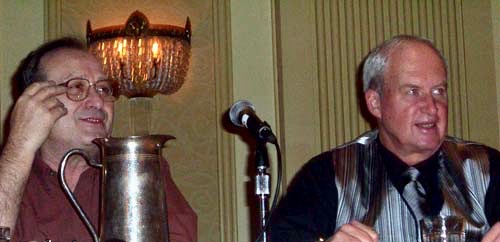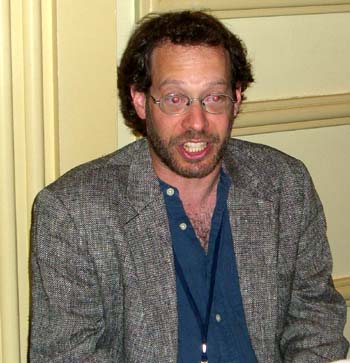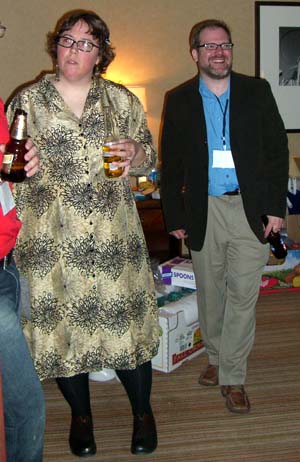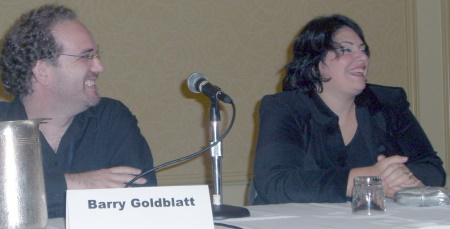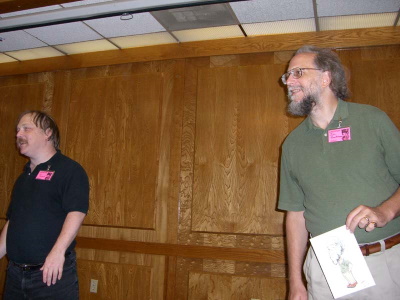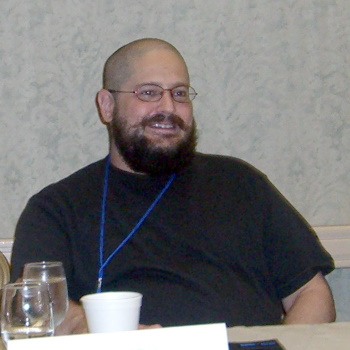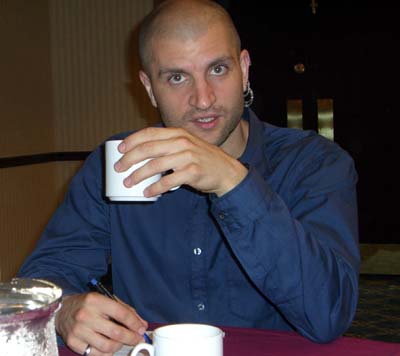Panelists: Elizabeth Bear, Matt Cardin, Lynn Flewelling (moderator), David Levine, Andrew Wheeler
What it was supposed to be about? Here's a preview of the panel as published in the program book. What are the benefits and drawbacks of community development and audience interaction in the new online environments? Does the ease and speed of feedback change the nature of the fantasy writer's process and work?
If there was one panel at the World Fantasy Convention that was a waste of time, this was it. A decade after the internet became mainstream, some of the panelists sounded as if they still lived in the mid-nineties era of wide-eyed wonder: OMG, there are people inside my computer!. To be fair, this tone was set by one particular panelist, who was 10-15 years older than everyone else on that panel, and a self-proclaimed Luddite. This person's comments were peppered by such exclamations as "On the other side of that wall, the screen of the computer, are total strangers, who are reading about my personal thoughts! People who read my blog now know where I live and what I do in the morning!" Hence, this person concludes: "I don't post anything that I wouldn't say out loud. And I don't mention the names of my children." Earth-shattering revelations, no less. :-)
Most other panelists seemed to have a much more comfortable relationship with technology. Unfortunately, the panel did not go beyond rehashing some old cliches about the internet. Is a persona one presents to the internet as real as the actual person? Are online activities more like acting, where you create the kind of persona you like? Etc. Is there anything left to say on this topic that hasn't been said since the 1990s? Judging from the panelists' comments, no.
To be fair, one panelist countered the usual perception that people's online faces are all fake. His online personality feels to him more authentic than his real-life personality, because his blog is the only place where he can fully express himself, where he can talk about things that truly interest him.
"I make my money by being a high school teacher. I deal with sophomores and juniors that tell me I use too many big words. My wife has no much use for books, reading, anything like that. She is very creative in a whole lots of ways, but we can't talk on this level. So these things I can't say in the social context, in the family context. So in my blog I say a lot of things that I can't say anywhere else, but they are authentic to me. "
This isn't unheard of; it was the "My wife has no much use for books, reading, anything like that" part, coming from a writer, that gave me a pause. :-)
Three or so writers in this group have blogs on LiveJournal: among them, Elizabeth Bear (LJ username "matociquala" and "elizabethbear", and David Levine (LJ username "davidlevine"). Some others had blogs on Blogger. They compared notes on different types of blogs. It was agreed that, to quote Andrew Wheeler, "LiveJournal is more community driven, it gets more comments, more comments on comments. The software it runs it is very friendly in that way. It's good for threading comments. Blogger is more linear. So you get fewer comments."
Elizabeth Bear. In LiveJournal, threading is very helpful to posing a quick question and getting answers, or making a 1-line comment on a movie you've just seen.
Elizabeth Bear further says: I'm on LiveJournal. I liked the way its communities work. You wind up in a comunity, there's a network. I use my LiveJournal as a resource, when I need an answer. I ask the most amazing questions. Like about penis tattoing. I got really good answers from professionals, who have done that kind of work. I'm, wow, this is a tool! So to speak. (Audience laughs.)
That's a undoubtedly correct observation, but what's the use of discussing it in a World Fantasy Convention, when there are much better forums out there for discussing online communications? I don't see much writerly insight in that.
While others were comparing different kinds of blogging software, the self-proclaimed Luddite went into a detailed comparison between blogs (and LiveJournal in particular) and newsgroups. This person thought of blogs as being a special kind of newsgroups.
"A difference between a newsgroup and LiveJournal is that in LiveJournal you are the host of the party. But a newsgroup is much more egalitarian: everybody speaks. I prefer the newsgroup: it's less work, and the onus is not on you to be interesting several times a week. I feel a lot more exposed in LiveJournal. LiveJournal is about advertising: you make yourself more available."
Hmm. To me, newsgroups and blogs are two very different animals, and I never thought of one in terms of the other. Perhaps this would be natural if my first familiarity with the internet was through newsgroups, and this form of participatory activity imprinted itself so firmly in my mind that I would see any kind of internet community as a kind-of-a newsgroup. But there are fundamental distinctions between the two, such as the one pointed out later by one of the panelists: "On Usenet SF groups you would not post a message "I had a bad day" but on LiveJournal you would. LJ is much more personal." Also, as Elizabeth Bear noted, "on Usenet, everytime you post something, somebody would jump on your throat and correct your punctuation. It's just not worth it." I very much agree. Somehow the comments on LJ rarely get as vicious as flame wars in newsgroups. It could be that people are much more polite when they comment on someone's post than they would be in newsgroups, because they are on the other person's "turf". To berate someone in their blog post comments would be similar to coming to their house and slugging them in the face. :-) In the newsgroups, though, we are all on equal turf.
Such distinctions may be of interest to sociologists, but again, I don't see how this topic is relevant to the World Fantasy Convention. Are these insights specific to fantasy or science fiction writers? Hardly. Well, it's just that, perhaps, you know the panelists are writers when they employ metaphors such as these:
Andrew Wheeler: In Blogger you feel like you are holding forth from a podium.
David Levine. LiveJournal is more like, everyone has a little table in their corner of the room, and we are passing notes...
Lynn Flewelling. Or throwing paper airplanes at each other.
By the way, the questions posed in the panel synopsis in the program book could have been answered in two sentences:
Does the ease and speed of feedback change the nature of the fantasy writer's process and work?
All the panelists gave an unequivocal "no". Or rather: the reader community influences what they write about in their blogs, but not their fiction writing.
Matt Cardin. I have a small dedicated audience who read my stuff. [...] When I started to blog this past summer, it picked up a lot of steam, there's a lot of comments flying back and forth. So the blog posts I'm writing to somebody. But my fiction [is something I'm writing for myself]. Blogging hasn't affected the way I write.
Andrew Wheeler. Sometimes you feel you do blogging for comments, or for links. You want to throw stuff out there and you want to see what people think about it. So you say things in a bigger, stronger way than you would otherwise.
None of the panelists think it's a good idea to tailor your fiction to what you perceive your blog readers want. Matt Cardin tells a story about Orson Scott Card started to respond to his readers' feedback in the newsgroups on the first two books in some of his series (not Ender), and quality of his next books plummeted.
Andrew Wheeler. One thing to remember is that the people who talk back are not usually representative of the larger readership. Knowing what the readers who are NOT talking to you actually want is fairly difficult.
Elizabeth Bear. If you start doing what everybody wants, you'll achieve mediocrity. There isn't a good book that hasn't bounced off at least one wall. If you are perfectly nice in your writing, you'll produce pabulum.
The writers seem to agree that while blogs don't actually help to sell books (Elizabeth Bear says she has sold no more than a couple of books through her blog), they are still a useful marketing tool.
David Levine. Having a blog is a lot like being at a convention. Having a face. I use my own name on my blog, and my own picture as my LiveJournal user icon...
(Elizabeth Bear. That's not Will Shakespeare?
David Levine. That's older, Jewish Shakespeare.)
David Levine. ... so that the editors would recognize my name and face from my blog. Just like at conventions, editors may think, he seems like a nice guy, he seems like he won't embarrass me if I send him on a book tour.

Elizabeth Bear and David Levine. See more pictures from this panel in my blog post on the "Fantasy, blogosphere and social networking" panel.
